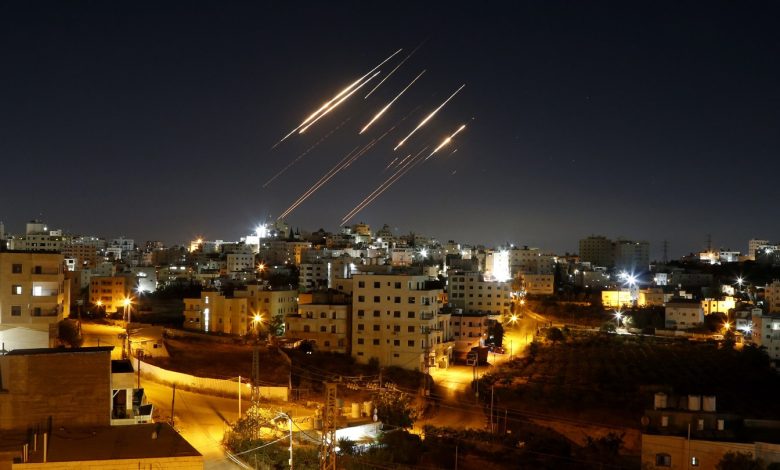Israel-Iran Conflict Dominates Global News

The ongoing military conflict between Israel and Iran continued to lead newscasts and headlines across the world on Monday, as Israel came under renewed missile attacks from Tehran and Israeli forces targeted a series of sites in western and central Iran.
The headlines ranged from the apocalyptic: “World Crisis” screamed the 60-point front page of Britain’s Daily Mirror, to the strictly factual of Turkey’s Hürriyet Daily News, which went with “Israel, Iran trade strikes again as conflict rages.”
The mutual strikes pushed the death toll from four days of open conflict close to 250, with Iranian media reporting more than 200 deaths since Israel began its air attacks on Friday, and Israel’s official death toll now topping 20.
The conflict also topped newscasts worldwide, with all-news channels, including BBC Worldwide and Sky News in the U.K., France’s France 24, and Germany’s Deutsche Welle TV, providing rolling coverage and regular updates from correspondents on the ground. But the scale of the coverage is well below the wall-to-wall approach seen following the October 7 attacks on Israel two years ago.
Two major exceptions to this are CNN and Middle East-based news network Al Jazeera, which have been providing blanket coverage of the conflict since Friday. The two channels have extensive networks of correspondents in the region and specialize in this kind of 24/7 crisis coverage. For CNN, whose future remains in the balance following news last week that parent Warner Bros. Discovery is splitting into two separate companies, with CNN and other cable brands hived off into a new Global Networks division, the conflict is also a chance to demonstrate its USP, both to its corporate overlords and to potential future buyers.
Inside Israel, popular tabloid Yedioth Ahronoth focused on the military execution and its fallout, warning of a broader security threat across multiple fronts. The Jerusalem Post praised the intelligence behind the strike but cautioned against “opening a door that cannot be easily closed,” while The Times of Israel underscored the operation’s potential electoral implications and the absence of direct U.S. involvement. The liberal daily newspaper Haaretz struck a more sceptical tone, questioning the long-term viability of the strike and tying it to Prime Minister Benjamin Netanyahu’s waning domestic legitimacy.
Across the Arab world, responses were shaped by national political alignments. Saudi channels Al Arabiya and Al Hadath reported the developments primarily using Western and U.S. sources, alongside official Saudi government statements. Sky News Arabia’s coverage also included official Iranian statements and broader international reactions to the conflict.
Lebanon’s press mirrored internal divisions inside the country, with An-Nahar highlighting the effectiveness of Israel’s strikes in killing Iranian scientists and military commanders, and outlets close to the Iranian-backed Hezbollah militant group focusing on official statements out of Tehran. Egypt’s media, by contrast, adopted a restrained, agency-led reporting style, avoiding overt commentary.
Getting into Iran, and reporting freely while there, has proven a challenge for many international news groups, and the bulk of reporting on the conflict from the news networks, is coming out of Israel, with some outlets, such as Germany’s ARD, also reporting out of Turkey, across the border from Iran. Coverage from Iran has been mostly limited to official footage of areas hit by Israeli missiles and reporting from state media and Iran’s semi-official Tasnim News Agency.
Alongside reporting on the latest attacks, International coverage has focused on the rationale for Israel’s sneak attack on Friday. Tel Aviv claims it was a preemptive strike aimed at destroying Iran’s nuclear capabilities before the country acquired an atomic bomb, which could threaten Israel’s existence. Tehran says the attacks were unprovoked, saying its atomic energy program is solely for peaceful purposes. An Iranian foreign ministry spokesperson on Monday said that while the Iranian parliament is preparing a bill to leave the nuclear Non-Proliferation Treaty (NPT), Tehran remains opposed to the development of weapons of mass destruction.
International reporting has also highlighted the divisions between Western powers. U.S. President Donald Trump has lauded Israel’s offensive, while denying Iranian allegations that the U.S. had any part in the attacks, and has said Iran could end the war quickly by agreeing to tough restrictions on its nuclear program. In an interview with ABC News on Sunday, Trump said he was open to Russian President Vladimir Putin, an Iranian ally, acting as a broker to negotiate a ceasefire. Reuters, however, quoted French President Emmanuel Macron, who rejected the idea of Putin as a peacemaker.
“I do not believe that Russia, which is now engaged in a high-intensity conflict and has decided not to respect the UN Charter for several years now, can be a mediator,” Macron said.
International news coverage also reflected the shifting view of Israel two years into the war in Gaza. Many outlets that were broadly supportive of Israel’s military action in the immediate wake of the Hamas-led attacks of October 7, in which more than 1,100 people were killed and more than 200 hostages taken captive, have become sharply critical of Israel as it continues to bomb civilian areas in Gaza and restrict access to food and humanitarian aid.
The Palestinian death toll from the 20-month Israel-Hamas war passed 55,000, the Gaza Health Ministry said Wednesday, June 11. Last week, 5 nations — Australia, Canada, New Zealand, Norway, and the United Kingdom — formally sanctioned far-right Israeli ministers, Itamar Ben-Gvir and Bezalel Smotrich, for “incitement of violence” against Palestinians in the occupied West Bank and Gaza.
Elsewhere on the dial, the Israel-Iran conflict jostled for attention with other news stories. CBC News Network, the all-news channel run by the Canadian public broadcaster, balanced updates from Tel Aviv and Tehran with a look at the G7 summit taking place in the Canadian Rockies on June 16 and 17. The political crisis in Spain — where a corruption scandal threatens to topple the government of Spanish Prime Minister Pedro Sánchez — knocked the Middle East off the top spot there.
Many networks also carved out time for recap coverage of the mass “No Kings” protest against U.S. President Donald Trump and Saturday’s military parade in Washington DC, timed to celebrate the 250th anniversary of the U.S. Army, as well as being Trump’s own birthday.
The Herald Sun, the conservative daily out of Melbourne, Australia, picked a Trump-themed front page: “Steel & Fury,” headlining both the parade and the protests, with news on Israel and Iran relegated to a button on the upper banner. Trump and No Kings pushed Middle East news off the front page of the Hong Kong-based South China Morning Post, the English-language newspaper owned by Alibaba Group, which chose instead to quote Beijing state media, noting that the “Parade, Protests show US in decline.”
Source: Hollywoodreporter
HiCelebNews online magazine publishes interesting content every day in the celebrity section of the entertainment category. Follow us to read the latest news.
Related Posts
- Jeffrey Dean Morgan Says He's Auditioned 'Zero Times' Since Playing Denny Duquette on Grey's Anatomy (Exclusive)
- Eric Dane Reveals His Right Arm No Longer Works Amid ALS Battle
- Tom Brady Celebrates Father's Day with Message About How He Tries to 'Live Up to the Example' of His Own Dad
- Stephen Curry, Nicola Coughlan, Patton Oswalt Lead All-Star Voice Cast of Sony’s ‘GOAT’
- Henry Winkler Shares His Life's Greatest Thrill as He Examines Danger and Fun in Hazardous History (Exclusive)





